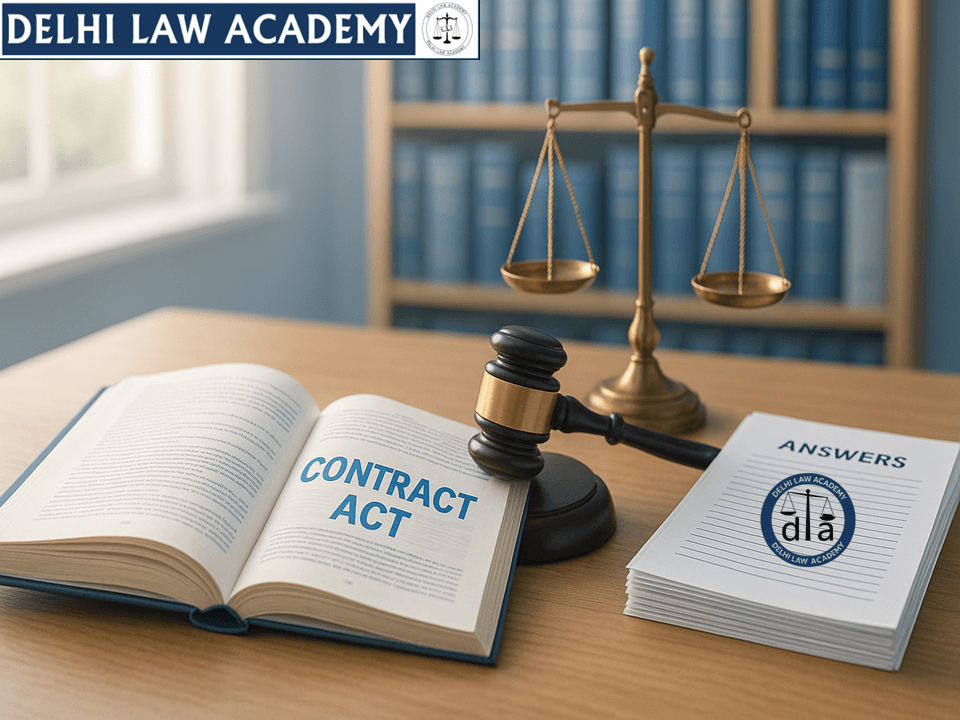
📘 The Indian Contract Act 1872: Sections 68 – 72
⚖️ Section 68
Section 68
If a person incapable of entering into contract is supplied with necessaries suited to his condition in life the person who has furnished such supplies is entitled to be reimbursed from the property of such incapable person.
Illustrations
(a) A supplies B, a lunatic, with necessaries suitable to his condition in life
A is entitled to be reimbursed from B’s property.
(b) A supplies wife and children of B, a lunatic, with necessaries suitable to their condition in life. A is entitled to be reimbursed from B’s property.
💰 Section 69
Section 69
A person who is interested in payment of money which another is bound by law to pay and who therefore pays it is entitled to be reimbursed by the other.
Illustration
B holds land on a lease granted by A, the zamindar. Revenue payable by A to Govt being in arrear, his land is advertised for sale by the Govt. Such sale will lead to annulment of B’s lease. To prevent the sale and consequent annulment of his own lease, B pays the Govt the sum due from A. A is bound to make good to B the amount so paid.
🤝 Section 70
Section 70
Where a person lawfully does anything for another person or delivers anything to him not intending to do so gratuitously and that other person enjoys its benefit he is bound to make compensation for or to restore the thing so done or delivered
Gratuitously:
• given without return or recompense
• given or received without cost or obligation; free
Great Eastern Shipping Company Limited v. Union of India
The plaintiff lawfully carried a cargo of coal and delivered it to the defendants union. The correspondence showed that the plaintiff did not intend to do it gratuitously and the defendant had accepted the cargo and thus defendant became liable to pay compensation to the plaintiff under section 70.
📦 Section 71
Section 71
A person who finds goods belonging to another and takes them into his custody is subject to same responsibility as a bailee.
NOTE:
Care to be taken by bailee
Bailee is bound to take as much care of the goods bailed to him as a man of ordinary prudence would take of his own goods of same quantity and value as goods bailed under similar circumstances.
💸 Section 72
Section 72
A person to whom money has been paid or anything delivered by mistake or under coercion must repay or return it
Illustrations
(a) A and B jointly owe 100 rupees to C. A alone pays the amount to C. B, not knowing this fact, pays 100 rupees over again to C. C is bound to repay the amount to B
(b) A railway company refuses to deliver up certain goods to the consignee except upon payment of an illegal charge. The consignee pays this illegal charge in order to obtain his goods. He is entitled to recover this payment
⚖️ Doctrine of unjust enrichment
Unjust enrichment has been defined as:
“A benefit obtained from another, not intended as a gift and not legally justifiable, for which the beneficiary must make restitution or recompense.”
A person who has been unjustly enriched at the expense of another must legally return the unfairly kept money or benefits. It is a general equitable principle that a person should not profit at another’s expense and therefore should make restitution for the reasonable value of any property, services or other benefits that have been unfairly received and retained.
Unjust enrichment is an equitable doctrine applied in the absence of a contract and used to prevent one person from being unjustly enriched at another’s expense. The doctrine of unjust enrichment is codified in the Contract Act under sections 68 to 72.
Essential Elements of Unjust Enrichment
For the doctrine to apply, three elements are generally required:
• The defendant has been enriched by the receipt of a benefit.
• The enrichment was at the plaintiff’s expense.
• The retention of the enrichment is unjust.
Bhagavadas Krishnadas v. P.S. Soma Iyer:
The purchaser of property allowed the seller-defendant to continue their residence in the building until they found other occupation and there was no indication in the evidence that the plaintiff had done so gratuitously. The plaintiff-purchaser was entitled to remuneration for use and occupation.
📚 Continue Your Contract Act Preparation
Don’t stop here! Strengthen your knowledge of the Contract Act with our other fully solved tests:
📘 Free Study Material for Judiciary Aspirants!
Download our FREE study material prepared by Delhi Law Academy’s expert faculty.
❓ FAQs on Indian Contract Act 1872 (Sections 68–72)
Contact us
📍 Delhi Law Academy – Jaipur Branch
6C, Tower 2, Coaching Hub, Pratap Nagar, Jaipur – 302033
📞 Phone:
+91 9911916552
+91 8447285606
✉️ Email:
contactus@delhilawacademy.com

